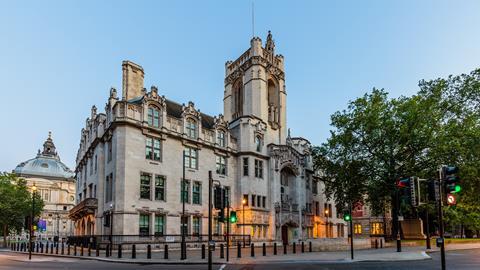The Supreme Court has unanimously allowed an appeal over conditional fee agreements, finding a judge cannot include, directly or indirectly, any allowance for a success fee when determining the appropriate relief to be awarded under the Inheritance (Provision for Family and Dependants) Act 1975.
Today’s judgment in Hirachand v Hirachand and another means an award made under the 1975 act should not include any contribution to the success fee under a conditional fee agreement (CFA), and should not be considered by the court as part of a claimant’s ‘financial need’.
The case centred on a family inheritance dispute in which the claimant daughter was awarded a lump sum, including £16,750 ‘as a reasonable CFA mark-up and costs’. However the daughter’s CFA with her solicitors provided for a success uplift of 72%, amounting to £48,175.
The High Court found the uplift formed part of her financial needs and fixed the amount awarded at £16,750 as being approximately a 25% uplift. Her opponent in the dispute, the widow, appealed the decision. The Court of Appeal dismissed the appeal.
In the latest judgment, Lord Richards, with whom Lord Lloyd-Jones, Lord Leggatt, Lord Burrows and Lord Stephens agreed, said that claims under the 1975 act remain ‘civil proceedings subject in the usual way to the costs regime in the CPR, it would undermine the costs regime and produce an incoherent result if a party could recover base costs not under that regime but by way of the substantive award’.
Nothing in the 1975 act ‘displaces expressly or by necessary implication’ the principle that in civil proceedings subject to the costs regime now contained in the CPR, costs between parties are to be dealt with ‘exclusively under that regime’, the judgment stated.
Success fees payable by a party form part of the costs incurred by them in the proceedings, the judgment said, adding: ‘The fact that because, under the overall regime governing costs, success fees are not recoverable from other parties does not mean that they cease to be part of the costs of the proceedings.’
Read more
The judgment said Hirachand’s case was a ‘clear case where a substantive order would undermine the costs regime’.
It added it would be ‘incoherent’ if, when parliament enacted that success fees should not be recoverable costs in any civil proceedings, the principle that costs of proceedings are not recoverable as part of a substantive order in those proceedings ceased to apply.
The Supreme Court allowed the appeal and excluded from the order made in favour of the daughter any sum for the success fee payable by her in these proceedings.
Katie Alsop, partner at Wright Hassall, instructed by the appellant, said: ‘We welcome the clarification that success fees due under a conditional fee arrangement are not recoverable as part of a substantive award for reasonable financial provision made under the 1975 act.’
Alistair Spencer, inheritance disputes legal director at Lime Solicitors, said the judgment represented a ‘significant shift in the landscape of inheritance claims’.
He added: ‘This decision provides clear guidelines on the recovery of legal costs, offering more cost certainty for those involved in inheritance disputes. For consumers, this means more certainty in inheritance disputes and a clearer understanding of the financial implications of pursuing a claim.
‘The Supreme Court’s decision in for the foreseeable future brings clarity and consistency to the application of success fees in inheritance claims. Perhaps the government should consider changing the rules for these claims to ensure that the sums awarded to claimants are spent on their maintenance and not on success fees for lawyers.’
Cathryn Culverhouse, partner at DMH Stallard, said the judgment was ‘bad news for claimants’ but ‘the right decision in law’.
She added: ‘Success fees relate to the costs of bringing court proceedings which are to be determined after an award is given by the court. It is difficult to see how they could constitute a part of the damages to be awarded.’
Paula Myers, national head of the will, trust and estate disputes team at Irwin Mitchell, said: ‘By making it clear that the success fee is not recoverable it is hoped we will see a reduction in speculative claims.’
Scott Taylor, head of private wealth disputes at Moore Barlow, who represented the daughter, said the case was a ‘first of its kind’. He added: ‘We now have the final answer. Whilst it’s not the one we were hoping for for our client, it clarifies the long-standing debate.
‘Unfortunately, it does mean that going forward clients who sign no-win, no fee CFAs for claims under the Inheritance Act 1975 will not be able to recover the success fee agreed with their legal advisors as part of their award.
‘Instead, claimants will need to consider making applications at the outset of their claim for an interim award to help with funding or consider other arrangements with their lawyer which include no win, no fee arrangements where they will bear the burden of any uplift if they are successful.’
This article is now closed for comment.






























7 Readers' comments